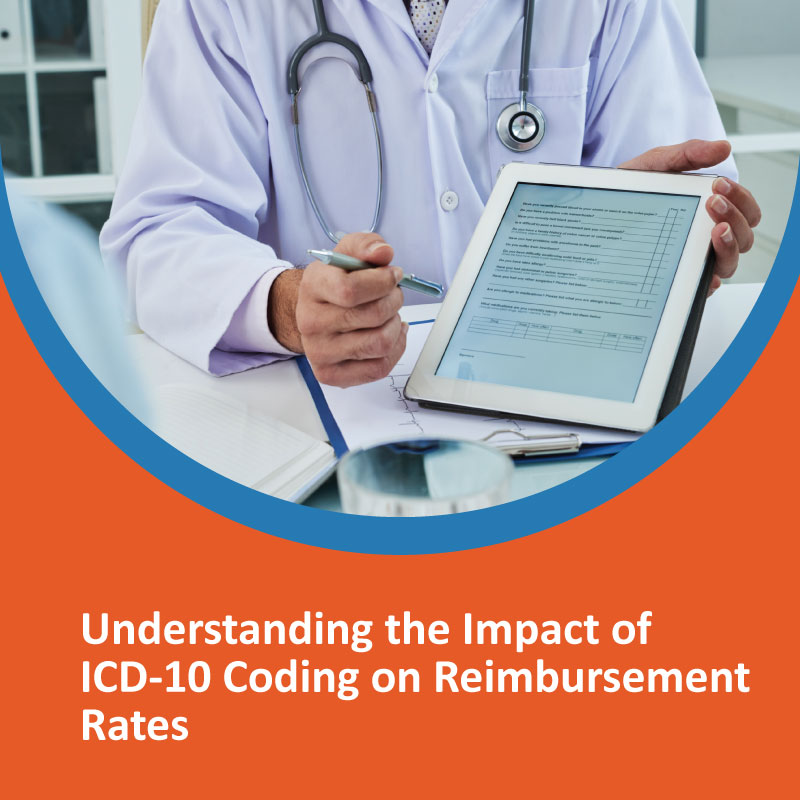In the evolving landscape of healthcare, accurate coding is pivotal not only for clinical documentation but also for securing appropriate reimbursement. The transition from ICD-9 to ICD-10 brought about significant changes in how diagnoses are recorded and how healthcare providers are compensated. This blog delves into the nuances of ICD-10 coding and its profound impact on reimbursement rates.
What is ICD-10?
The International Classification of Diseases, 10th Revision (ICD-10), is a coding system developed by the World Health Organization (WHO) and adopted by the Centers for Medicare & Medicaid Services (CMS) in the United States. It replaced the outdated ICD-9 system, offering greater specificity and detail in coding diagnoses and procedures. ICD-10 includes over 69,000 codes, compared to approximately 14,000 in ICD-9, allowing for more precise documentation of patient conditions.
Read this: The Role of Medical Billing in Preventing Fraud in Healthcare
The Link Between ICD-10 Coding and Reimbursement Rates
Accurate ICD-10 coding directly influences reimbursement rates through several mechanisms:
1. Enhanced Specificity and Accuracy
The detailed nature of ICD-10 codes enables healthcare providers to document patient conditions more precisely. This specificity ensures that the services rendered are appropriately matched to the correct codes, reducing the likelihood of claim denials and facilitating timely reimbursements.
2. Impact on Diagnosis-Related Groups (DRGs)
Hospitals often receive fixed payments based on DRGs, which are determined by the primary diagnosis and procedures performed. The transition to ICD-10 necessitated adjustments in DRG assignments, as the increased specificity can lead to different groupings compared to ICD-9. This shift can affect reimbursement amounts, highlighting the importance of accurate coding in aligning with the appropriate DRG.
3. Risk Adjustment and Hierarchical Condition Categories (HCCs)
For programs like Medicare Advantage, reimbursement is influenced by risk adjustment models that use HCCs. ICD-10’s detailed coding allows for more accurate risk assessments, ensuring that providers are compensated based on the complexity and severity of their patient populations.
Challenges in ICD-10 Coding and Reimbursement
Despite its advantages, the implementation of ICD-10 coding presents several challenges:
- Training and Education: Healthcare providers and coding professionals require comprehensive training to familiarize themselves with the new coding system.
- System Upgrades: Electronic Health Record (EHR) systems must be updated to accommodate the expanded code set, which can be resource-intensive.
- Documentation Practices: Clinicians must adapt their documentation practices to capture the necessary details for accurate coding, which may initially increase the time spent on record-keeping.
These challenges underscore the importance of preparedness and ongoing education in maintaining accurate coding practices.
Best Practices for Optimizing Reimbursement Through ICD-10 Coding
To maximize reimbursement rates, healthcare providers should consider the following strategies:
- Invest in Training: Regular training sessions for coding staff and clinicians ensure familiarity with ICD-10 codes and their proper application.
- Enhance Documentation: Encouraging detailed and precise documentation by clinicians aids in accurate coding and supports the reimbursement process.
- Utilize Technology: Implementing advanced coding software can assist in selecting the most appropriate codes, reducing errors and improving efficiency.
- Regular Audits: Conducting periodic audits of coding practices helps identify areas for improvement and ensures compliance with coding standards.
Conclusion
The adoption of ICD-10 coding has transformed the healthcare reimbursement landscape by providing greater specificity and accuracy in documenting patient conditions. While challenges exist, the benefits of accurate coding in securing appropriate reimbursement rates are substantial. By investing in training, enhancing documentation practices, and leveraging technology, healthcare providers can navigate the complexities of ICD-10 coding and optimize their reimbursement processes.
FAQs: Understanding the Impact of ICD-10 Coding on Reimbursement Rates
- What is ICD-10 coding?
ICD-10 (International Classification of Diseases, 10th Revision) is a system used to classify and code diagnoses, symptoms, and procedures in healthcare. It is more detailed than the previous ICD-9, offering over 69,000 codes to accurately document patient conditions. - How does ICD-10 affect reimbursement rates?
ICD-10 coding directly impacts reimbursement rates by ensuring accurate documentation of diagnoses and procedures. This leads to proper claim submissions, reduces denials, and ensures healthcare providers are reimbursed appropriately. - What is the difference between ICD-9 and ICD-10?
ICD-9, the previous coding system, had a limited number of codes (around 14,000), while ICD-10 has over 69,000 codes, providing greater specificity and detail. This increase in specificity allows for more accurate billing and reimbursement. - How do Diagnosis-Related Groups (DRGs) relate to ICD-10 coding?
DRGs are used to determine the fixed payment a hospital receives based on the patient’s diagnosis and procedures. ICD-10’s enhanced specificity can lead to different DRG assignments compared to ICD-9, affecting reimbursement amounts. - What role do Risk Adjustment and Hierarchical Condition Categories (HCCs) play in ICD-10?
For programs like Medicare Advantage, HCCs and risk adjustment models determine reimbursement. ICD-10’s detailed coding ensures more accurate risk assessments, which directly impacts reimbursement for providers caring for more complex patient populations. - What challenges do healthcare providers face with ICD-10?
Providers may face challenges such as the need for extensive training, system upgrades to accommodate the new code set, and adapting clinical documentation practices. These challenges can initially slow down the coding process but are essential for accurate reimbursement. - How can healthcare providers ensure accurate ICD-10 coding?
Providers can ensure accuracy by investing in ongoing training for clinicians and coding staff, improving documentation practices, using advanced coding software, and performing regular audits to maintain compliance. - How does ICD-10 improve the accuracy of billing and coding?
The expanded and detailed code set in ICD-10 allows for a more precise representation of patient conditions, reducing errors and ensuring that healthcare providers are reimbursed for the appropriate services rendered. - Can ICD-10 coding impact claim denials?
Yes, inaccurate or incomplete ICD-10 coding can lead to claim denials. Proper documentation and accurate coding reduce the chances of denials and ensure timely reimbursement for healthcare services. - What steps can healthcare providers take to optimize reimbursement with ICD-10?
Healthcare providers should invest in training for staff, encourage detailed and accurate documentation, utilize coding software, and conduct periodic audits to identify errors and optimize the reimbursement process.

